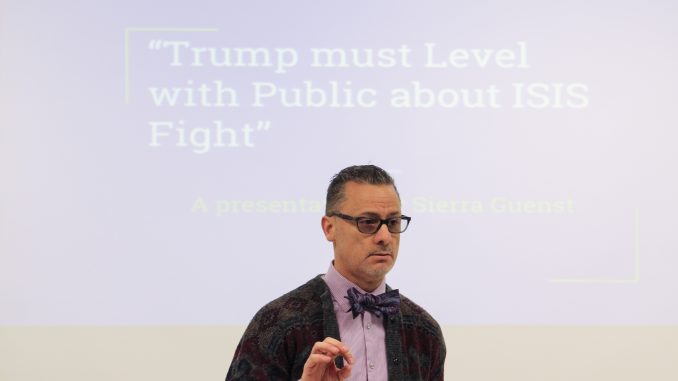
When every other member of the Rhetoric and Public Advocacy Club graduated last year, junior strategic communications major Sierra Holland thought she would struggle to find new members. The club grew, however, to 15 regular members who were interested in discussing the tumultuous presidential election season, she said.
Within the rhetoric and public advocacy track, President Donald Trump and his language throughout the campaign have been used as tools for teaching rhetoric.
“Our goal is to spread social awareness and help people understand the issues faced by many Americans,” Holland, the president of the club, said. “Especially issues surrounding the Philadelphia community, such as homelessness, issues faced by the LGBTQ community, issues faced by women, the environment and things of that nature.”
“We just try to stay aware and keep each other aware about what’s going on and how we can best stay active and well-informed in this current climate,” Holland added.
Holland said she and the other RPA club members often talk about Trump and his language during club meetings and rhetoric classes “because he is so different than political candidates that we’ve seen in the past.”
Holland said some of her professors have used Trump’s rhetoric as examples for classical rhetoric terms like the “Strawman fallacy” — when someone willfully misrepresents an opponent’s argument in a debate — and “demagogue” — a political leader who uses the public’s prejudices instead of reason to gain support. However, her professors still encourage open discussion among students regardless of political views, she added.
“My professors don’t want to alienate the students who might feel empowered and feel heard for the first time with this presidency, but it’s safe to say that most of us are scared and worried about it,” she added. “At the end of the day our professors are just trying to teach us, point blank. We’ve been talking a lot about classical rhetoric and how the words that you use really matter.”

Guillermo Caliendo, Holland’s rhetorical theory professor, teaches his students classical persuasion techniques and stresses the importance of language, also using the immigration orders as an example.
“He works with us to point out just how important the words we use are,” Holland said. “Going down to very basic things, such as when someone will say ‘I believe’ or ‘I feel’ or ‘I think.’ He’ll say, ‘Do you believe, do you feel or do you know?’”
Caliendo said although he does not support Trump, he tries not to let his personal political leanings impact the conversation in his classroom. He said Trump’s campaign and now presidency have been an interesting “case study” about the use of rhetoric and persuasion in politics.
A recent example of Trump’s rhetoric, Holland said, is his choice to use the words “removable alien” instead of “undocumented immigrant” in his executive orders that were issued on Jan. 25.
“The words they use for immigration are working to dehumanize the group so people stop protesting and get on board with [Trump’s] agenda,” she said.
Caliendo said Trump’s choice to use the words “national security” when talking about immigrants and refugees plays into American’s emotions and underlying fear because “national security in itself has the connotation and understanding that we are safe.” The idea of national security is easier to sell than exclusion, he said.
“What I try to do is concentrate on the use of language and the ways in which he has persuaded people one way or the other,” he said. “One of the things I keep repeating is that if Trump sold a box of cereal to people, however you slice it, 60 million plus bought it. Tongue in cheek, I would say that is a very successful political campaign.”
“That’s what’s interesting to me as a professor of rhetoric,” he said. “We see the mechanics of language at work. Now, whether we agree with the person and the issues, that’s a different story. But … it’s interesting at the linguistic aspect. Even if I disagree with him, this is the most incredible exercise of persuasion I’ve ever seen in my life.”
Erin Moran can be reached at erin.moran@temple.edu or on Twitter @ernmrntweets.


Be the first to comment